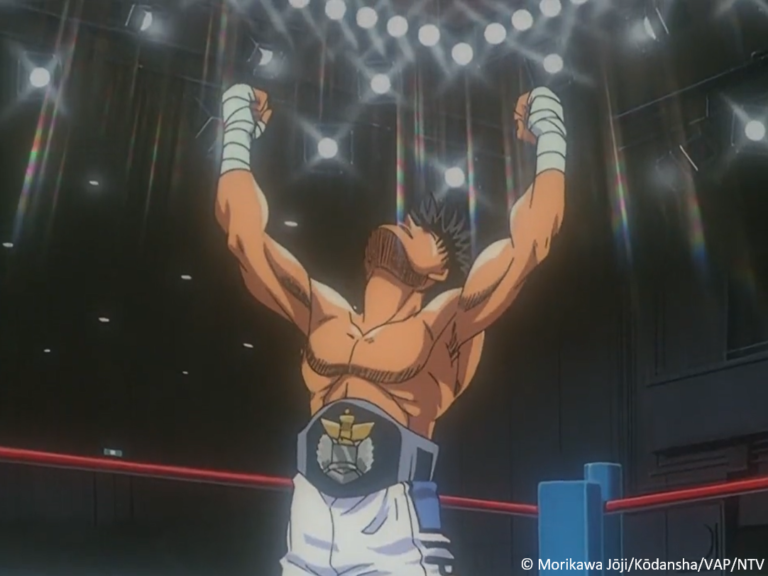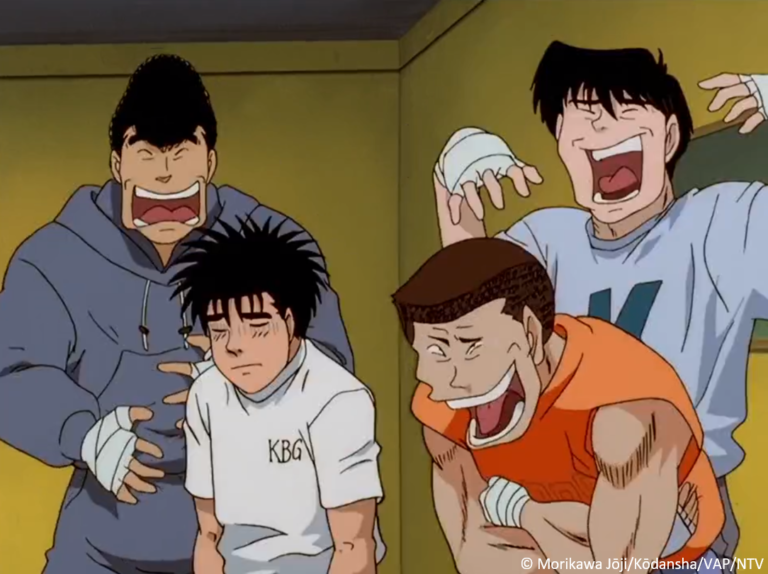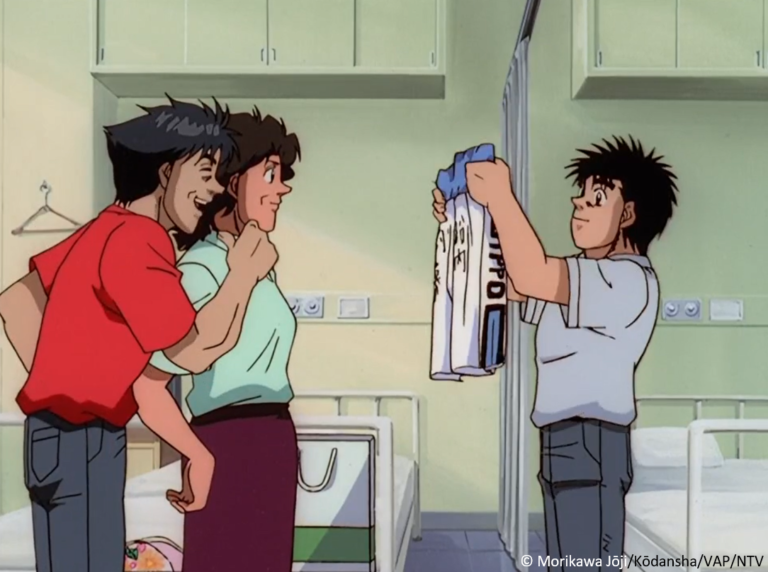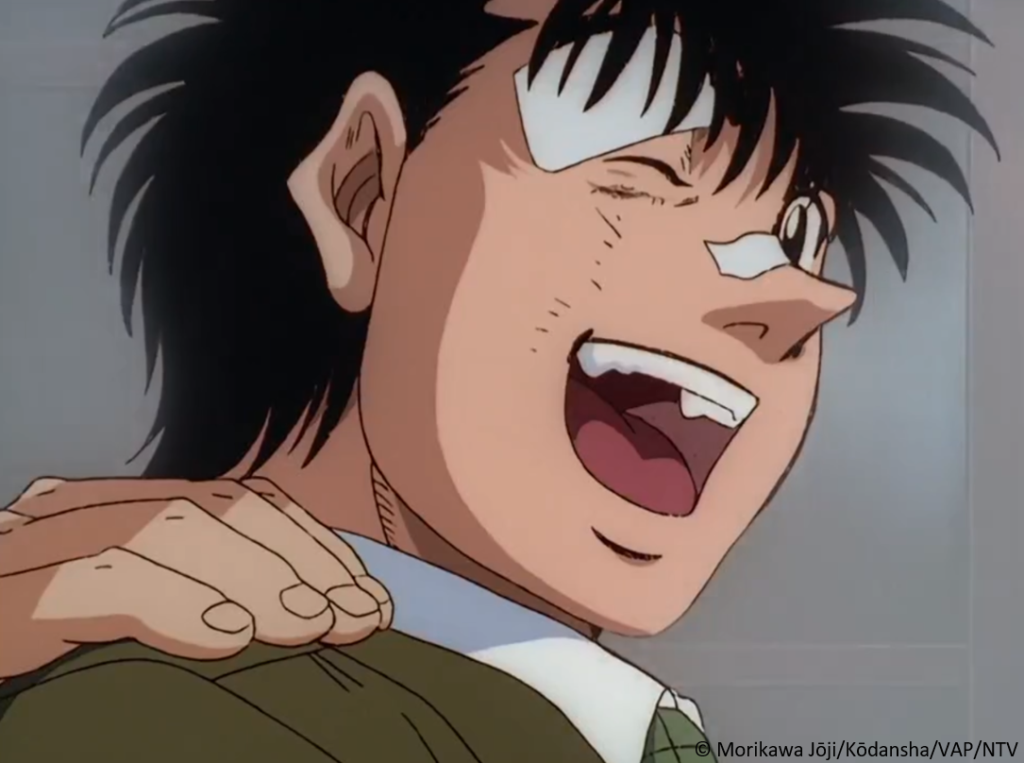[Post originally published on substack on October 29, 2022.]
You don’t have to be fond of boxing to enjoy Hajime no Ippo. In all honesty, I was never really interested in this sport, but Ippo, the lovable main character of the story, and his friends and foes captivated me. An abundance of nail-biting action will get your heart racing with excitement. In between the thrilling fights, you are given just enough time to steady your breathing and loosen up your clenched fists by following the boxers’ daily lives, filled with hard training, goofing around, and hunting for Mrs. Right. So yes, the anime is exciting and fun to watch, and it even has some love stories in store for those of you who enjoy a heartwarming romance. That said, boxing is a violent sport, where brawny men batter each other with full force, leading to swollen eyes, bleeding cuts, and broken bones. Blood and guts aside, the main story revolves around Makunouchi Ippo, his love for boxing, and his quest to find out what it means to be strong.

The Bullied Kid
The anime starts off by introducing Ippo as an earnest, hardworking, and responsible teenager who supports his mother with her everyday work at her fishing boat rental company. Unfortunately, these duties prevent him from engaging in teenage life and keep him from making friends. And because he is different from the other kids at school, his classmates label him a “loser”. In an off-screen conversation, but within earshot of Ippo, one of the girls remarks to her classmates that she has seen Ippo being harassed by some scary-looking guys. They then laughingly conclude that Ippo’s timid nature makes him an easy target for bullies. No sympathy for the odd one out… .

A few scenes later, we can observe for ourselves what the girl was talking about. On his way home from school, Ippo encounters Umezawa and his two sidekicks. The three boys seem to possess highly refined olfactory senses as they complain about Ippo’s ‘wormy’ smell, caused by his occupation at home. Apparently, this warrants verbal insults and a thorough beating. The two sidekicks watch while Umezawa goes all out with his hands-on lecture toward the smaller boy, and we soon see blood spattering about. Ippo’s ordeal ends when Takamura, the best fighter at the Kamogawa boxing gym, happens to pass by and intervenes. He puts the three ruffians in their place by demonstrating his physical superiority—without laying a finger on them—and they hurriedly take their leave. Ippo manages to stay conscious just long enough to witness Takamura’s prowess and later wakes up in an unfamiliar place—the Kamogawa boxing gym.
Good Guy Takamura
In an attempt to encourage Ippo to take a stand against the bigger boys, Takamura tells him that he hates those who prey on the weak. But those who don’t defend themselves really “piss him off”, too. (Hmmm, do I sense a little bit of victim-blaming here?) Seeing that his encouragement didn’t have the desired effect, as it made Ippo cry, Takamura tried a different approach. He thought that letting Ippo punch the sandbag would cheer him up, but to get the timid boy into the spirit, Takamura encouraged him with a kick and headlock. Dissatisfied with Ippo’s hesitant first punch, he deemed it necessary to provide further corporal stimulation. To this end, he delivered a carefully administered kick into a place that even Umezawa was kind enough to spare. Contrary to Umezawa, Takamura doesn’t hit Ippo’s face, so there are no observable spatters of blood, but his treatment nonetheless looks very painful… .

Even before becoming a boxer, Takamura was quite capable of communicating with his fists. With his big build and enormous ego, he most likely never had any trouble defending himself. Naturally, he recommended the same to his junior: “If you don’t do something about it, everything will stay the same”. But Ippo who was lacking the same mindset and physique felt disheartened by this advice. Seeing his dejection, Takamura, in a last attempt to lift the boy’s spirit, handed him two VHS tapes titled the World Title K.O. Collection to watch at his leisure. These videotapes, together with the demonstration of Takamura’s strength, sparked a new sense of determination in Ippo and set him on a new path in his life.
The Rocky Path To Becoming A Pro-Boxer
Invigorated by the elevating feeling of punching the sandbag at the gym and fascinated by the strength of the boxers shown on the tapes, Ippo decided to dedicate himself to becoming a professional boxer. However, his new career path was littered with obstacles, the initial one being the very person who urged him on in the first place. Contrary to his previous encouragement to do something, Takamura now firmly discourages Ippo because a “bullied wimp” like him would never survive in the tough world of boxing. But Ippo, against all expectations, passes test after test that is laid before him, thanks to his tenacity and his ability to ‘take a beating’. The boss of the Kamogawa gym, usually called Chief (or Old Geezer, depending on who’s calling him) is blown away by Ippo’s power and willpower alike. Therefore, he took it upon himself to train the boy, transforming him into an outstanding boxer and, at the same time, into “the hope of all bullied kids in the whole of Japan.”

Leaving aside the various definitions and forms of bullying, whenever bullying (in Japanese: ijime) is mentioned in the anime, it’s clear that talk is about Umezawa and his sidekicks. However, Umezawa is not the only one who is accused of bullying. During Ippo’s last ‘qualification test’ to become an official member of the Kamogawa gym, he had to hold out against his peer and boxing prodigy, Miyata. Trying to knock Ippo down, Miyata pounded him relentlessly, causing his fellow boxers to accuse him of bullying the weak newcomer. But Miyata, looking at his badly bruised arms after the match, states that Ippo is not weak and therefore, beating him was not bullying at all. Ippo, too, sees a clear difference between the emotional burden of the bullying and the physical pain he receives from Miyata’s punches.
Thus, it has now been established that the only real bullies portrayed in the story are Umezawa and his two friends. And we, as viewers, can rest assured that all other punches, kicks, verbal insults, and teasing by other characters are not bullying. I guess, the various occasions where Takamura strips Ippo naked, or where he hands out insinuating and derogative nicknames also don’t count as such. After all, Takamura, despite some of his character flaws, is the good guy, so his behavior is excused. The same is true, of course, for the other two Kamogawa boxers, Aoki and Kimura, who don’t miss a single chance to tease Ippo to their heart’s content. Well, men have their own ways of showing affection, respect, and support. Also, that’s just how comic relief works.

Besides, it’s thanks to the thorough support of these experienced boxers that Ippo successfully fights his way from the debut match to the East-Japan and subsequently the All-Japan Rookie King Final, right until he holds the JBC featherweight belt in his hands.
Life-Changer Boxing License
We never find out why Umezawa assaulted Ippo. His attitude towards his victim changes though, when he realizes that Ippo is the proud owner of a professional boxing license. Umezawa explains why: “Of course we like boxing! Boxers are the pinnacle of manly strength! All delinquents idolize them.” (Short side note: there are also women who box. The most recent example is the EUBC Women’s Boxing Championships in October 2022). I wonder why Umezawa didn’t consider boxing as a recreational or competitive activity for himself. Particularly at the Kamogawa gym which seems to be a safe haven for former delinquents.
Anyhow, Umezawa’s antipathy turns into admiration on the grounds of Ippo changing his profession—from handling fishing bait to dealing with boxers. This blossoming respect comes into full bloom at Ippo’s second official match, where the novice boxer had to deal with a sneaky and unfair opponent with no eyebrows, Fujiwara Yoshio. The underhanded actions of Fujiwara cause an outrage among the three delinquents-turned-fans, and they begin to cheer most fervently for their former victim. After the match, they dotingly look at Ippo, standing in the ring below them, and justify their actions against him: it wasn’t because of the smell, or because of his passivity or lacking authority. No! They could see all along how strong he was… . Well, there we have it—an explanation for bullying Ippo since grade school. Ippo’s license and the triumphant result of the match take their friendship to a whole new level, with Umezawa proudly presenting his new buddy to his delinquent acquaintances.

After Umezawa grew fond of Ippo, his guilty conscience must have grown alike, because he tried to apologize to him a couple of times. Even though he never manages to do so, he does his best to make up for his past behavior by becoming the leader of Ippo’s cheering squat and by supporting him in whichever way he can. This ranges from providing customized boxing garments, to helping Ippo’s overworked mother at the fishing boat company and detailing Ippo’s life story in his manga. Umezawa, the former bully, turned into an aspiring manga artist.

Bullies, Buddies, and Barf-michi
Watching the behavior of the characters, I kept wondering about where to draw the line between playful teasing, being mean, and bullying. Ippo actually reproaches Takamura once for using Naomichi, a newly joined member, as an errand boy (in Japanese: tsukaibashiri). There is no sign that this is viewed as bullying, though. On the other hand, Naomichi uses the same expression to describe the way he was bullied. So, where’s the difference? Well, as we have already established, Takamura and the rest of the Kamogawa crew are the good guys, which automatically eliminates any negative associations with their actions. But what about Naomichi’s—rather insulting—nickname that Takamura so creatively came up with? Inspired by Naomichi’s habit of throwing up every time he exerts himself, Takamura named him Barf-michi. It’s not clear if Takamura meant it in an affectionate, teasing, or matter-of-fact way, but the name sticks. Yet, since Naomichi never does something, and nobody comments critically on this, it seems that he didn’t mind… .
Coping Strategy
History tends to repeat itself, and so Ippo finds himself, two years after he started boxing, in the same situation in which Takamura was when the two first met. A bullied kid, looking up to a mighty and strong-willed man, wanting to be like him. Naomichi has the same aspirations, but instead of Takamura, he has chosen Ippo as his hero. Impressed by Ippo’s unbreakable spirit during fights and by his tenacity to get back up every time he was beaten down, he wishes for the same strength. Probably for the same reasons because Naomichi, too, was bullied. After hearing that Ippo had a similar past, Naomichi agitatedly declares: “You’re the hope of every bullied kid across Japan.”

In answer to Naomichi’s question about why the bullying stopped, Ippo refers to his new-found devotion to boxing. Dedicating himself entirely to his training, he didn’t pay attention to his surroundings anymore, and before he knew it people around him had changed. But wasn’t it rather that they changed along with Ippo because boxing was his sport of choice? After all, it was practicing an awe-inspiring sport that had earned him the respect of neighboring delinquents. And being fast on his feet, thanks to his training, left Umezawa and his crew, who were regularly chasing him after school, in the dust. When they finally managed to catch up and tried to lunge at him, Ippo expertly dodged them. I wonder how things would have turned out had Ippo chosen another sport.
The story depicts the connection between boxing, getting stronger, and the end of bullying quite explicitly. But Ippo was able-bodied, strong-willed, and gifted with a talent for boxing to begin with. While this doesn’t minimize his personal development and success, it also means that boxing isn’t a feasible solution for “all the bullied kids in the whole of Japan”. I think the biggest impact on Ippo’s life and his self-confidence, wasn’t that he could dedicate himself wholeheartedly to something he loved, but that he thereby found a place of belonging. A place where he was able to make friends, where he felt welcomed, respected, and accepted just the way he is.

What Does It Mean To Be Strong?
Unfortunately, at the end of season 1, Ippo still hasn’t found an answer to this question, even though he characterizes most of his opponents as strong, who all in turn say that Ippo is strong. It’s quite puzzling, to be honest. But maybe, Ippo is looking for a different kind of strong. This raises the question: is physical prowess or mental perseverance all there is to strength? Doesn’t it show a certain kind of strength, that Ippo didn’t waste a single thought on revenge but accepted Umezawa’s friendship and support, despite what the bigger boy did to him? Does it reflect strength that Ippo, in spite of his success, remained the polite and inconspicuous teenager he was at the beginning? Strength… what a mushy and, indeed, as the Chief says, intangible concept.
A Serious Topic – Then And Now
Some of you are probably too young to have ever shoved a VHS tape (or Betamax, for that matter) into a recorder; others will have sighed nostalgically when the tapes appeared on the screen. They also give a hint about the time in which the story is set, and this coincides almost perfectly with the start of the publication of the manga Hajime no Ippo by Morikawa Jōji in 1989. The anime was released eleven years later, in 2000. While the use of VHS tapes has declined over the years and is now as good as non-existent, bullying is still prevalent today, and not only in Japan. Ippo was beaten and insulted, but it can also take on other forms, from social exclusion or being forced to ‘run errands’ (tsukaibashiri) to cyberbullying. What form is more prevalent can also depend on the country and its cultural context.
[Post originally published on substack on September 28, 2022.]

Regardless of country or form, talking openly about bullying in settings where it actually occurs (for example schools, playgrounds) is difficult, and even more so when you are on the receiving end. One of the strengths of the story is that it openly addresses a serious topic in a lighthearted way and thereby draws attention to an issue that was just beginning to surface publicly and academically in 1980s Japan, so, shortly before the time of the serialization of the manga.
Of course, the main plot is not about bullying but about boxing, friendship, belonging, and dealing with challenges. It’s a charming, exciting, and encouraging story to watch. However, if you are interested in looking a little closer at how people and their stories are portrayed and reflecting on the underlying issues, the anime offers you much more than just plain entertainment. [Post based on season 1]

Links:
- Original post published on sportsbaka.substack.com
- For comprehensive information on Hajime no Ippo: Wiki Ippo by Fandom
- Hajime no Ippo manga: chapter 1 preview
- Boxing in Japan: The Japan Boxing Commission (JBC)
Subscribe to never miss a deep dive into the exciting world of sports anime, manga, and manhwa!

